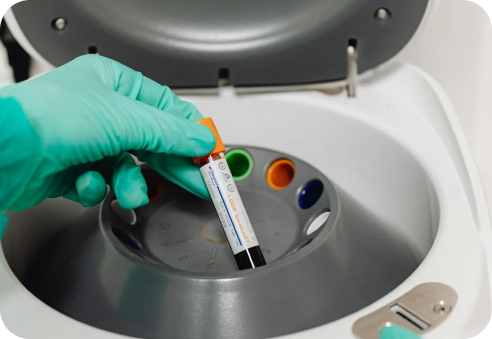
The Anti-Müllerian Hormone (AMH) levels provide insight into a woman’s ovarian reserve - the quantity and quality of eggs remaining in the ovaries. Higher or normal AMH levels indicate a healthy ovarian reserve, suggesting a good number of eggs available. Conversely, low AMH levels suggest a diminished ovarian reserve, which may influence fertility options. While AMH is a valuable marker, it’s important to remember that it’s only one part of the overall fertility picture.

For anyone thinking about having children, especially if you plan to wait a little longer, AMH testing can give you a lot of insight into your ovarian reserve so that you can make better choices about your reproductive health.
AMH levels naturally decline as part of the aging process. Younger women generally have higher AMH levels, indicating a greater number of eggs. Starting in the late 20s and continuing through the 30s and 40s, these levels gradually decrease, reflecting the natural decline in ovarian reserve. By menopause, AMH levels are typically very low or undetectable. This decline is normal but underscores the importance of considering age in fertility planning.

The test specifically measures the amount of Anti-Müllerian Hormone (AMH) in your bloodstream. Higher levels usually mean you have a good number of eggs remaining, suggesting a healthy ovarian reserve. On the other hand, lower levels can point to fewer eggs, which may impact your ability to conceive.
Getting the AMH test is pretty straightforward and is much like any other blood test. There’s usually no need to fast or do anything special beforehand and you can typically expect to get your results in a few days. It’s important to review these results with a medical professional, as whilst this test gives an indication of your ovarian reserve, there are many more factors than can influence your fertility.

An AMH test is helpful for any woman trying to conceive who wants to understand their fertility potential.
It’s also recommended for those thinking about delaying pregnancy, women undergoing fertility treatments, and those with conditions like polycystic ovary syndrome (PCOS) or irregular menstrual cycles.
If you're over the age of 35 and want to fall pregnant, an AMH test can give you some clarity about your ovarian reserve and guide you to the right fertility treatment.

The costs involved really depend on the clinic but typically costs between $85 and $100. Whilst it isn’t eligible for Medicare rebates, it’s best to speak with your private health insurance to see if it can be covered under your private insurance plan.

Falling pregnant might not be as easy as you had hoped. Your ovarian reserve tells us a lot about your reproductive health and what treatments might work best.
As a fertility specialist who offers complete continuity of care, we can start with the investigations in order to inform your future reproductive health and timeline.
The Anti-Müllerian Hormone (AMH) test measures ovarian reserve, helping to assess a woman’s fertility potential and likelihood of success with treatments like IVF.
The AMH test is a simple blood test that can be done at any time during the menstrual cycle. No special preparation is needed.
Higher AMH levels suggest a higher ovarian reserve, while lower levels may indicate diminished fertility potential.
Women considering pregnancy, egg freezing, or IVF should consider testing in their late 20s to early 30s to better understand their fertility.
While AMH levels naturally decline with age, smoking, chemotherapy, and certain medical conditions can also negatively impact them.
Many fertility clinics, including Dr. Anthony Marren’s practice, offer AMH testing as part of a comprehensive fertility assessment.
Costs vary, but AMH testing typically ranges from $80 to $150. Some clinics offer package deals for fertility assessments.
Understanding the emotional journey couples endure when they have difficulty conceiving or recurrent pregnancy loss is essential to my approach.
Creative Advertising by Kiin Agency.